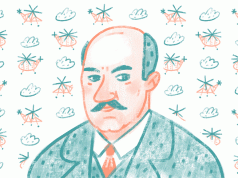In this fantastical story, the author imagines himself meeting with Bel Kaufman a few years after her death in 2014 at the age of 103. Kaufman, whose birthday was May 10th, was the granddaughter of seminal Yiddish writer Sholem Aleichem and the author of “Up The Down Staircase” (1964), which spent 64 weeks on the New York Times Best Seller list. Kaufman, who was born in Berlin while her parents studied medicine there, was an undisputed Grand Dame of New York City social life and was very fond of her childhood memories of Odessa.
The Odessa Review Managing Editor Regina Maryanovska- Davidzon published an obituary for Kaufman when she died in Tablet Magazine.
She appears a flawless vision, like a perfectly toasted Russ & Daughters’ bagel heavily schmeared with waves of cream cheese, topped with nova, resembling Persichino de Prun limestone, finished with a thin slice of Bermuda onion. In “real life” we had met three times, accompanied by my daughter: once for lunch at The National Arts Club, weeks later for a Sabbath dinner at the home of a close friend, and then, after many months, in a palatial Upper East Side brownstone, sharing jokes and made-up stories over limp hors d’oeuvres washed down with mediocre Chardonnay, for an event honoring a famous Hollywood actor.
Today’s lunch is different. It’s just the two of us; lithe, literary acrobats, energized by a sense of merriment and a boisterous, make-believe narrative: the concoction of a shared collective unconscious, both heirs to the aroma and taste of tall tales and mystical stories, the grammar and syntax of shtetl life.
Clear out of the blue, Bel arrives confidently perched on high heels, a formidable presence, making her way through a curtain of crushed red velvet into the once “fancy,” kosher steak restaurant, well past its prime. Her eyes exude the bygone world of the Odessa of her childhood, “a city of poets and sailors, merchants and musicians, Jewish intellectuals and exotic strangers from beyond the Black Sea,” as she once wrote in an essay. Radiating the inherited understanding of the distress and misfortune of men and women living under the tsar, like the pious Tevye, a milkman, and his wife, coping with the challenges of raising six troublesome daughters, and the human comedy of daily existence, as tenuous as a fiddler balanced precariously on the roof.
Tzeitel, Hodel, Chava, Shprintze, Beilke, and Teibel, all the product of the imagination of Bel’s maternal grandfather, Solomon Naumovich Rabinovich, “the Jewish Mark Twain,” better known by his pen name Sholem Aleichem, which literally means “Peace be upon you,” the traditional Hebrew and Yiddish greeting.
“‘My little Bellochka’ he called me,” Bel says, adding, “My cousin Tamara and I were his only grandchildren born when he was alive. He loved us very much and he loved to spend time with us. And he would always give us unusual gifts.”
“‘Do you see that mountain over there?’ he would ask. ‘I just gave it to Tamarochka.’ ‘You see this lake? I am making it a present for my Bellochka.’ We were so very pleased with those wonderful presents. Only when I grew up did I understand his greatness and the gift that he granted the world. He left a heritage of love and laughter. Love for the common people, and laughter in the face of adversity.”
Eddie Share, the owner of the restaurant where we meet, escorts Bel — as protocol dictates — in the style to which she has grown accustomed, royally, to our table where I am already seated. Although past 103, Bel Kaufman could easily be mistaken for a vibrant octogenarian; bold, bright, vivid, strong. Also, impish, brilliantly simple, pulsating with keen observations and energetic good humor. She runs a perfectly manicured finger across the heavily starched white tablecloth. The high-gloss finish of a red Ferrari comes to mind as Bel’s words and imagination speed ahead to surprising finish lines.
Bel remembers a dinner at this very table, “her table,” the exact spot where she first came up with the idea for the three-and-a-half page Saturday Review article which would later be turned into her bestselling book, Up The Down Staircase, a fictionalized version of her experiences teaching in the New York City public schools.
“I got the title from the principal, who saw me walking up the down staircase. A terrible crime. We had no elevators. The stairs were separated so that nobody would bump into one another.”
Time magazine called it “easily the most popular novel about U.S. public schools in history.”
Recalling how it all happened, Bel’s eyes light up. “They give me an advance to write the book. It was quite a bit, but I used it up because I had no money. And you know what happens? You have to write the book. That’s why I wrote. I remember saying to my editor, who will pay $4 for a hardcover book about school? Nobody will buy it. A few people bought: seven million.”
Even after its success, Bel continued teaching. “For the first time in my life, I stood in front of these eyes, which stared at me in expectation, waiting for me to give them something. Something important, something memorable. It was a formative moment, and I have never forgotten that feeling.”
And the cherce words that came out of their mouths come trippingly off Bel’s tongue, as they have before so many times. “We study myths like Orpheum & his girl friend because it takes place in the Greek Underground.”
And the suddenly remembered message left in the class suggestion box: “You’re a good teacher except for the rotten books you have to teach like the Oddissy. I wouldn’t give it to a dog to read.”
Bel takes in the entirety of the restaurant––dark wood, red velvet, a strange operatic-ish stage set, its near-comic formality now fallen on hard times.
In her Russian-inflected English, she declaims, “So many memories!I love this place!”
The day it closed in 1996, the headline in The New York Times read, Lou G.’s Serves Last Meal To Saddened Regulars.
The article went on to say that for 79 years, Lou G. Siegel’s had been the Rick’s Cafe Americain of the kosher set, “a crossroads for garment center business deals, politics, matchmaking and schmoozing in an old-fashioned Jewish restaurant with the refinement of white tablecloths. Among the observant, everyone came to Lou G.’s”
Located on 38th Street off Seventh Avenue in the heart of the schmatte district, it was there that I had birthday and other celebratory dinners with my grandparents, and my first insights into the mysterious workings of the adult mind, fueled by generous helpings of matzoh ball soup, gefilte fish and stuffed derma, served by balding Jewish waiters in ill-fitting, poorly-pressed tuxedos.
When Lou G.’s shut its doors for the last time, I, along with the other faithful, compared it to the demise of the Roxy, the old Metropolitan Opera House, and Penn Station. Even Yankee Stadium, “the house that Ruth built.”
Observing a waiter serving an appetizer to another table, Bel remembers reading somewhere that the derma served here was so rich in beef fat that it had killed more Jews than had Arab fighters.
Bel looks at me, waiting for the expected reaction; soon a big grin bursts out on my face. When menus arrive, there are two hundred and thirteen items to choose from, including: calf’s liver steak, lamb chops, roast prime ribs of beef, Vermont turkey, Long Island duckling, boiled chicken, chopped beefsteak with fried onions, potted meatballs, stewed lamb’s tongue in mushroom sauce, lungen and miltz stew en casserole, kreplach to taste, and Yankee pot roast. We each order borscht and a half spring chicken. For dessert we will share a prune danish, and drink coffee, black.
Suddenly there is a mischievous twinkle in Bel’s eyes. She takes a long, slow, deep breath, then blurts out in a higher decibel, “So, how’s my Fishman?” referring to the name of the protagonist in my first novel. Although we had discussed the book, Bel never read the completed manuscript: Malakh ha-maves took her away. Even so, her curiosity about the story seemed unending.
“How did it turn out?” she asks.
“It’s hard to say,” I tell her. “Not a lot of interest or big bucks for a story about a Wall Street trader who, losing everything, reinvents himself as a FedEx shipping clerk, and, in the process, saves the world and achieves redemption.”
“Hmm, reminds me of Sabbatai Zevi, “ Bel observes, alluding to the 17th century Sephardic rabbi and kabbalist who claimed to be the long-awaited Jewish Messiah. Faced with the choice of being put to death or converting to Islam, he chose the latter, donning from then on a Turkish turban.
“No, not my Fishman! He’s a different kind of messiah!” I tell her. “Like his amigos: Palefsky, Goldberg, Weintraub, Fleckenstein, and Lefkowitz.”
“How so?” Bel wonders.
“All characters. Real. Like you and me.”
“Probably more like you than me!” Bel says matter-of-factly.
“I’m not sure how to read that,” I say.
And then I reach into my breast pocket and pull out two folded, heavily edited pages.
“Want to hear what I’m working on?” I ask.
When I see her moving in close, I begin to read.
I was at loose ends. The world, engulfed in madness, and at home, my wife engaged in a fantastic piece of scientific research, buffing her tits, conversating with the TV and radio.
At one time, everyone just knew me as Smokey Weiner, The Kishke King — a rumpled, stumble bum, would-be entrepreneur, a perplexed, slap-happy fumbler, dawdler, blundering renegade, castaway — hawking long stretch franks, “built for two,” fourteen chews to the bite, ten inches long. Also, inventor of the ultra-pure, one hundred percent, all-beef Mazelburger, Megillah French fries, and, of course, the eighteen varieties of orthodox-certified glatt kosher kishke.
Keep in mind, all this was before Mozart, Rothko, and Proust, when I still thought of myself as a well-bred and courteous gentleman who possessed an understated wit and a penchant for marrying very wealthy women about every ten years; when my favorite sound was still the frizzle of eggs frying, and my life’s philosophy solely based on the lyrics of a Mel Brook’s song.
“Hope for the best! Expect the worst!
Some drink Champagne. Some die of thirst.
No way of knowing
which way it’s going.
Hope for the best! Expect the worst!”
Then one day, I had enough. “Genug,” I said to myself!
It was time to move on.
But why go on like this?
Why?
Because You are about to hear a story bigger than anything I can tell on my own. A tale that contains the recipe for writing the world’s greatest novel, executed by a computer; the truth behind the ancient halachic prohibition against verbal oppression; the unknown story of Eliezer, eldest servant of Abraham; the lurid details of an elaborate Chinese funeral; and the odyssey of a most unusual man, a no-hoper right from the get-go.
Bel, laughing, takes a sip of water and says in a polite, yet clinical tone, “What a mind you have, my friend! My cousin, Moishe, the renowned child psychiatrist, would have loved to get to know you!”
“Very funny! Want to hear more?”
“What’s there to lose? And so much time on my hands!” Bel answers.
I continue to read for a long while, and when I finish, I wait for my friend’s reaction, “That’s all I got. What do you think?”
“Let me tell you about a dream I had,” she says.
“Lola Babylon! I have no idea why I thought of her. Her real name was Nina Athena, born to a family of Greek dry cleaners, and she was an aspiring writer. ‘Pain to Strength,’ the poem she was working on, was about a young woman standing in a rainstorm, shouting to the sky and the echo that reverberated all around: “let me tell you a story,” “let me tell you a story,” “let me …”
“How about that!” Bel states categorically, before adding that making it to 103 had taught her much about the wisdom of Shakespeare.
Then she recites from memory.
“Life’s but a walking shadow, a poor player
That struts and frets his hour upon the stage,
And then is heard no more. It is a tale
Told by an idiot, full of sound and fury,
Signifying nothing.”
I asked Bel if living so long had revealed fundamental secrets about the workings of the universe.
“There are no secrets!” she assures. “Only known facts and mysteries. And bigger and better stories!”
I tell Bel that anyone overhearing our conversation would think us certifiable.
Taking a last bite of danish, Bel laughed. Then she stood up firmly on her high heels, telling me to stay and enjoy the rest of my coffee. Kissing me on the cheek, she waved goodbye.
Her final words of advice delivered with a raised eyebrow and long stare, “to be continued.”
ROBERT KOPPEL is the author of more than a dozen books of nonfiction and three novels: “ The Next Step: A Gobsmacking Odyssey of Reinvention”, “Why Love? A Punch-Drunk Proustian Odyssey”, and “Ivan Lefkowitz: Inspired By A True story”. He teaches creative writing in Providence, Rhode Island.



































